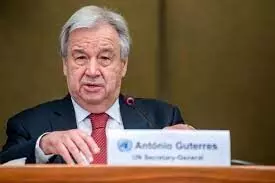
On Monday, UN Secretary General Antonio Guterres pledged to make 2023 "a year for peace" and "a year for action," highlighting the need for practical solutions to a raft of pressing problems facing all regions of the world.
Guterres, who made the pledge at the end-of-year press conference at UN Headquarters, said, "We owe it to the people to find solutions, to fight back, and to act."
Building on his general call to action, Guterres announced that he would convene a Climate Ambition Summit in September 2023 and called on every leader to "step up—from governments, business, cities and regions, civil society, and finance."
He said it would be "a no-nonsense summit." No exceptions. No compromises. There will be no room for backsliders, greenwashers, blame-shifters, or the repackaging of announcements from previous years.
The UN chief said it would be convened alongside a General Assembly opening-week summit already on the calendar, designed to accelerate action at the halfway point towards the ambitious Sustainable Development Goals (SDGs).
He said that although there might be "plenty of reasons for despair" amid the Ukraine war and associated cost-of-living crisis, leaving the poorest nations on "debt row" was not an option.
"This is not a time to sit on the sidelines; it is a time for resolve, determination, and, yes, even hope."
"Because despite the limitations and long odds, we are working to push back against despair, to fight back against disillusionment, and to find real solutions."
"Not perfect solutions—not even always pretty solutions—but practical solutions that are making a meaningful difference to people's lives.
"Solutions that must put us on a pathway to a better and more peaceful future"
He highlighted the deal just hours earlier, to halt the destruction of ecosystems worldwide, at the UN's Biodiversity Conference, COP15.
"We are finally starting to form a peace pact with nature," he said, urging all countries to deliver on their promises.
Progress has been made on ending conflict in some of the world's war zones, he said, pointing to the cessation of hostilities in northern Ethiopia as another "reason for hope" and a by-product of "a rebirth of diplomacy."
There's been progress in eastern Democratic Republic of Congo too, where armed groups have intensified the fight against government troops, drawing in UN peacekeeping forces, and "a truce in Yemen has delivered real dividends for the people."
In spite of pledges made at COP27 in Egypt and the biodiversity deal, it is clear that overall, the battle to limit emissions to just a 1.5 degree increase above pre-industrial levels is still "moving in the wrong direction," with the global emissions gap growing.
"The 1.5 degree goal is gasping for breath. National climate plans are falling woefully short. And yet, we are not retreating. "We are fighting back," added the UN chief.
He said the international community was now "fighting back to restore trust between North and South", with a deal over the long-stalled issued of Loss and Damage, at COP27.
Another positive step was taken in 2022 with the launch of an action plan to cover every person in the world with early warning systems within the next five years.
"Going forward, I will keep pushing for a Climate Solidarity Pact, in which all big emitters make an extra effort to reduce emissions this decade in line with the 1.5-degree goal and ensure support for those who need it.
Without it, he warned, "the 1.5 degree goal will soon disappear." I have pulled no punches on the imperative for all of us to confront this existential threat. and I will not relent."




